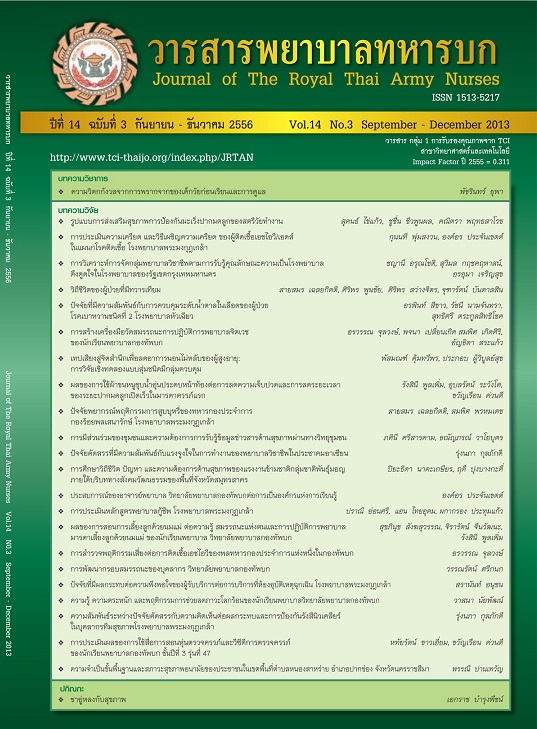ประสบการณ์ของอาจารย์พยาบาล วิทยาลัยพยาบาลกองทัพบกต่อการเป็นองค์กรแห่งการเรียนรู้ Experiences of Nursing Instructors in The Royal Thai Army Nursing College on Learning Organization
Keywords:
ประสบการณ์, อาจารย์พยาบาล, องค์กรแห่งการเรียนรู้, Experiences, Nursing Instructors, Learning OrganizationAbstract
การวิจัยครั้งนี้มีวัตถุประสงค์เพื่อบรรยายการเป็นองค์กรแห่งการเรียนรู้ตามประสบการณ์ของอาจารย์วิทยาลัยพยาบาลกองทัพบก ตามแนวคิดของ Senge (2006) โดยใช้ระเบียบวิธีการวิจัยเชิงคุณภาพ เชิงปรากฏการณ์วิทยา ผู้ให้ข้อมูลหลัก คือ อาจารย์พยาบาล วิทยาลัยพยาบาลกองทัพบก จำนวน 10 คน ใช้วิธีเลือกตามสะดวกจนกว่าข้อมูลจะลงตัว เก็บข้อมูลโดยการสัมภาษณ์แบบกึ่งมีโครงสร้าง วิเคราะห์ข้อมูลด้วยการวิเคราะห์เนื้อหา และการสร้างข้อสรุป
ผลการวิจัยสรุปได้ว่า 1) ผู้ให้ข้อมูลหลักส่วนใหญ่ให้ความหมายขององค์กรแห่งการเรียนรู้ในลักษณะ เดียวกันว่าองค์กรแห่งการเรียนรู้ หมายถึง องค์กรที่มีการพัฒนาตนเองอย่างต่อเนื่องทั้งในด้านวิชาการ การบริหาร และการบริการวิชาการสู่สังคม บุคลากรในองค์กรมีการหาความรู้ แลกเปลี่ยนเรียนรู้กันอยู่เสมอ มีผู้บริหารที่มีความเป็นผู้นำที่ดี ให้ความสำคัญต่อการเรียนรู้ 2) ประสบการณ์การเป็นองค์กรแห่งการเรียนรู้ ตามวินัย 5 ประการ พบว่าผู้ให้ข้อมูลหลักให้ความสำคัญกับการมีผู้นำที่ดีมองเห็นความสำคัญของการพัฒนาบุคลากร ให้การสนับสนุนในการฝึกฝนเพื่อเกิดวินัยทั้ง 5 ประการ ดังนั้น ผู้บริหารต้องมีความ
เข้าใจในคุณสมบัติส่วนบุคคลของบุคลากร ให้ความสนใจกับความแตกต่างระหว่างบุคคล สร้างบรรยากาศในสถานศึกษาให้เอื้อต่อการเรียนรู้ การสร้างแรงจูงใจ และสร้างความผูกพันต่อองค์กร ส่งเสริมให้บุคลากรมีการใช้วิธีการเรียนรู้หลายรูปแบบ ในทุก ๆ ระดับอย่างสมำเสมอและต่อเนื่อง โดยวางแผนการพัฒนาบุคลากรเป็นรายบุคคลอย่างมีส่วนร่วม และเน้นย้ำให้ทุกคนมององค์กรแบบภาพรวม ทุกฝ่ายมีความสำคัญ และมีทัศนคติที่ดีต่อกัน เพื่อให้เกิดการประสานความร่วมมือกันพัฒนาไปสู่การเป็นองค์กรแห่งการ
เรียนรู้ต่อไป
This research is aimed at describing the learning organization Follow to the experiences of nursing instructors in the Royal Thai Army Nursing College according to Senge (2006). The research employed qualitative research methodology as phenomenological study. The key informants were ten nursing instructors at the Royal Thai Army Nursing College, who were purposively selected. The data were collected until they
reach a point of clata saturation by semi-structured interviews. Then run on analyzed by content analysis and conclusions.
The results suggested that the majority of the key informants defined the learning organizational in the same way-a learning organization refers to an organization with continual self-development in terms of academic standards, administration, and academic services to society, with knowledge seeking and exchang, management leadership and giving precedence to learning. Concerning their experiences of the state of being
a learning organization under five disciplines, they pointed out importance of having good leaders who pay special focus on personnel development and provide support for training to have all five disciplines. Accordingly, administrators need to understand their personnel’s personal qualifications and pay attention to their differences, develop a climate that is conducive to learning, create their motivation and organizational engagement, and encourage them to regularly and continuously use a variety of learning methods at all levels.
Furthermore, administrators have to formulate plans to develop individual personnel in an inclusive manner, encourage them to look at the organization as the whole picture that all bodies are equally important, and promote their positive attitudes in order to achieve optimum cooperation in the organization and reach the status of “a learning organization.”
Downloads
Downloads
How to Cite
Issue
Section
License
บทความหรือข้อคิดเห็นใดใดที่ปรากฏในวารสารพยาบาลทหารบกเป็นวรรณกรรมของผู้เขียน ซึ่งบรรณาธิการหรือสมาคมพยาบาลทหารบก ไม่จำเป็นต้องเห็นด้วย
บทความที่ได้รับการตีพิมพ์เป็นลิขสิทธิ์ของวารสารพยาบาลทหารบก
The ideas and opinions expressed in the Journal of The Royal Thai Army Nurses are those of the authors and not necessarily those
of the editor or Royal Thai Army Nurses Association.






